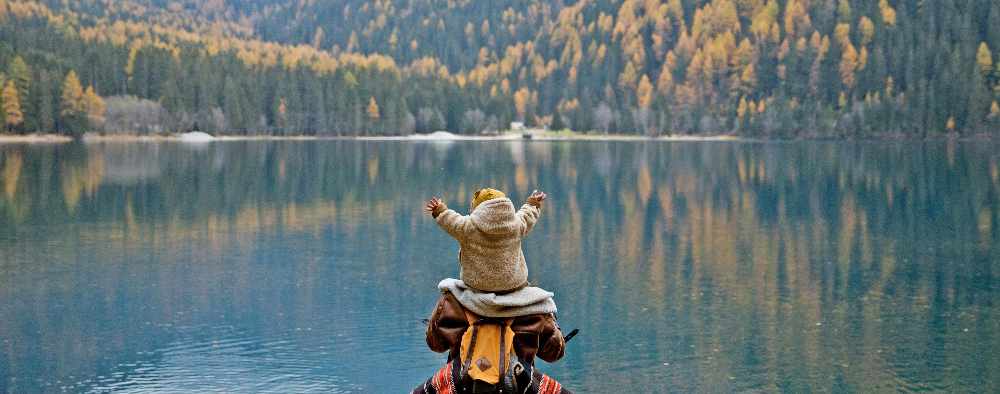by Susan Stamper •
Content Marketing Manager, ChiroHealthUSA •
With the beginning of school and pumpkin creamer hitting the shelves, it’s officially that time of year when we trade in flip-flops for fuzzy socks, and iced coffee for warm mugs of pumpkin spice lattes 🙌. The world outside starts putting on its best show—brilliant shades of crimson, tangerine, and sunshine drape the trees, while a crisp breeze whispers, “Hey, summer’s over, let’s get cozy.”
And let’s be honest: mornings in the fall? Magical. You can sit on your porch or balcony with your favorite brew, soak in that gentle sunshine, and feel the day start on the right foot. But here’s the kicker—being outdoors isn’t just about soaking up seasonal vibes or scouting Instagram-worthy leaf piles 🍁. Spending time in nature is one of the most underrated, science-backed ways to boost your health—mentally, physically, and emotionally.
So strap on your hiking boots, windbreaker (yes, I just aged myself 🤣), or even just your sneakers, because we’re about to explore why the great outdoors might just be your greatest healthcare plan. And spoiler alert—it doesn’t come with a copay.
🌳 Nature: The Original Therapist
Ever notice how just stepping outside after a stressful day feels like exhaling a breath you didn’t even realize you were holding? There’s a reason for that. Studies show that spending time in nature reduces stress hormones such as cortisol and helps regulate your nervous system (Mayo Clinic, 2024). Think of nature as the friend who always knows just what to say—you don’t need a big speech, just their presence makes you feel better.
Psychologists have found that time outdoors decreases feelings of anxiety, depression, and mental fatigue (APA, 2020). Imagine your brain as an overworked laptop—you know when it starts overheating and the fan kicks into overdrive? Stepping into nature is basically hitting restart, cooling everything down so you can actually function again.
🧠 The Brain Boost You Didn’t Know You Needed
Beyond mood, nature also has some sneaky superpowers for your brain. Walking in the woods or even spending time in a local park has been linked to better focus, memory, and creativity (Harvard Medical School, 2020). That means your next big idea for work, or how to finally organize your garage, might just come to you while strolling under a canopy of oak trees.
One study even found that nature exposure increases activity in brain areas associated with empathy and love (Bratman et al., 2021). Translation? You’re more likely to be patient with your coworkers, kinder to your kids, and less likely to rage when someone cuts you off in traffic. 🚗💨
💪 Nature as a Personal Trainer
Forget fancy gym memberships or the latest workout craze with equipment that costs more than your rent. Nature is the ultimate personal trainer, and it’s completely free. Hiking, biking, gardening, even raking those fall leaves all get your heart pumping and muscles moving.
Research confirms that outdoor physical activity not only boosts cardiovascular health but also makes you more likely to stick with exercise long-term (White et al., 2021). Why? Because sweating under a blue sky feels a lot less like “exercise” and a lot more like “fun.” Plus, let’s be real—chasing your dog through a park or climbing a hill for that killer view is way more exciting than staring at a treadmill display counting down calories.
🌞 Vitamin D: Nature’s Free Supplement
Let’s not forget about good old sunshine. Fall may not have the sweltering rays of summer, but those golden beams are still delivering your body’s best source of vitamin D. This little nutrient powerhouse supports bone health, immune function, and mood regulation (Nevada Today, 2023).
So yes, that “glow” you feel after a sunny morning walk isn’t just in your imagination—it’s your body thanking you with a biochemical cocktail of health benefits. 🌞✨
👩👩👦 Social Connection in the Great Outdoors
Nature also has a sneaky way of bringing us together. From tailgating at a football game to family hikes and neighborhood block parties, outdoor spaces invite connection. And research shows social bonds are just as important to your health as exercise and diet (Wang, 2023).
Think about it: roasting marshmallows by a campfire, chatting on the porch, or simply walking the dog in your neighborhood can all strengthen your relationships. I met new neighbors and their cute corgis just yesterday while out walking! It’s basically the ultimate two-for-one deal—better health plus stronger friendships.
🌲 Shinrin-Yoku: The Art of “Forest Bathing”
In Japan, there’s even a term for the intentional practice of soaking in the forest atmosphere: shinrin-yoku, or “forest bathing.” And no, it doesn’t mean you need to pack your rubber ducky and towel—it’s simply immersing yourself in the sights, sounds, and smells of the woods.
Studies have shown that this practice can lower blood pressure, reduce stress hormones, and improve immune function (Antonelli et al., 2021). So the next time someone asks why you’re wandering through the woods, just tell them you’re “bathing”—they’ll either be impressed or mildly concerned.
❄️ Don’t Let the Cold Stop You
Now, let’s be honest—eventually, that fall crispness will turn into winter chill, and the couch will start calling your name louder than the trailhead. But don’t hang up your outdoor gear just yet. Even in colder weather, getting outside—even briefly—can boost your mood, immune system, and energy levels. Bundle up, embrace your inner snowman, and remind yourself that fresh air is still free no matter the season. 🥶☃️
🌟 Making It Practical
Okay, so how do you actually “prescribe” nature to yourself without moving into a treehouse or hugging every oak in sight? Here are a few simple ways to sneak it in:
- Morning Ritual: Sip your coffee outside instead of at the kitchen table.
- Lunch Break Reset: Take a 10-minute walk around the block.
- Weekend Adventure: Find a local trail, park, or botanical garden to explore.
- Green the Routine: Add plants to your home or workspace if getting outdoors isn’t always easy.
- Family Fun: Plan screen-free time outdoors—yard games, picnics, or bike rides.
Remember, it doesn’t have to be a grand adventure. Even small doses of nature add up like spare change in a jar. Before you know it, you’ll be richer in health and happiness.
🌻 The Bottom Line
Fall is the perfect reminder that change can be beautiful—and that nature has always been our most reliable healer. Whether you’re chasing fall leaves, taking your morning coffee on the porch, or trying out some “forest bathing,” the outdoors has something for everyone.
So as the air gets crisp and pumpkin spice takes over the universe, make it a point to let the great outdoors work its magic on your body, brain, and spirit. Your health will thank you—no prescription required. 🍁💛
References
American Psychological Association. (2020). Nurtured by nature. Monitor on Psychology. https://www.apa.org/monitor/2020/04/nurtured-nature
Antonelli, M., Barbieri, G., & Donelli, D. (2021). Effects of forest bathing (shinrin-yoku) on levels of cortisol as a stress biomarker: A systematic review and meta-analysis. International Journal of Biometeorology, 65(8), 1255–1274. https://doi.org/10.1007/s00484-021-02017-7
Bratman, G. N., Hamilton, J. P., Hahn, K. S., Daily, G. C., & Gross, J. J. (2021). Nature experience reduces rumination and subgenual prefrontal cortex activation. Proceedings of the National Academy of Sciences, 112(28), 8567–8572. https://pmc.ncbi.nlm.nih.gov/articles/PMC9754067/
Harvard Medical School. (2020). A walk in the woods may boost mental health. Harvard Medicine Magazine. https://magazine.hms.harvard.edu/articles/walk-woods-may-boost-mental-health
Mayo Clinic Press. (2024). The mental health benefits of nature: Spending time outdoors to refresh your mind. https://mcpress.mayoclinic.org/mental-health/the-mental-health-benefits-of-nature-spending-time-outdoors-to-refresh-your-mind/
University of Nevada, Reno. (2023). Nature and the brain: Why we need to get outside. https://www.unr.edu/nevada-today/news/2023/atp-nature-and-the-brain
White, M. P., Elliott, L. R., Taylor, T., Wheeler, B. W., Spencer, A., Bone, A., … & Fleming, L. E. (2021). Green space, physical activity, and health: A systematic review of inter-relationships. Environmental Research, 191, 110038. https://www.sciencedirect.com/science/article/pii/S2352827321002093
Wang, J. (2023). The restorative benefits of nature on mental and social health. Open Journal of Social Sciences, 11(8), 90–102. https://www.scirp.org/journal/paperinformation?paperid=143377








